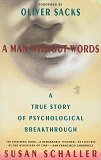We all know that if someone hasn't acquired language by, say, 10, then they never will, don't we? All those stories of "wild children" who never learned to speak, all those studies of brain plasticity tailing off into adolescence. So if we came across an adult with no language, we wouldn't even bother trying to teach him, because we know it's impossible, don't we? Well, when Schaller met Ildefonso, a deaf 27-year-old with no language, she didn't know it was impossible, so started teaching him American Sign Language. And succeeded.
This is the story of how Ildefonso came to learn a language, but first he had to learn the concept of language, that signs could be abstract referents for things. Not only did he learn, but he learned remarkably quickly, and eventually became a fluent signer. And he is not alone. Schaller tells of other deaf people who have grown to adulthood languageless and have subsequently learned to sign.
So why is the received wisdom so different? Schaller also tells the story of her interactions with academia, and the somewhat dismissive (or even downright incredulous) attitudes she met there.
It may be because the evidence of impossibility is based on very different cases: wild children, or children kept locked in cellars, with extremely impoverished or even non-existent social interaction: "environmentally retarded", as one researcher calls them. The cases Schaller describes are not like this at all: these people had been immersed in society, but their deafness and poverty had led to them never learning language, or even learning that there was such a thing as language, until adulthood. Also, I suspect, the intensive amount of time Schaller spent with Ildefonso, what appears to be several months essentially full time effort, made for a very different learning experience.
Like Sacks' Seeing Voices, there is deep anger here at educational systems that forbid deaf people to sign, so that they can fit into "normal society", but thereby depriving them of rich language, and so handicapping them further (is it better to be illiterate and inarticulate in normal society, or a richly linguistic member of Deaf society?). There is also anger at parents who protect their deaf children so much that they impoverish their social experience. But there is also hope: (given sufficiently rich social experience) it's never too late to learn to sign (but that is no excuse for not teaching it sooner).
